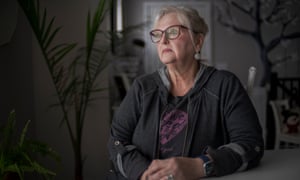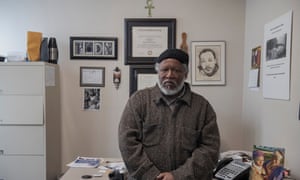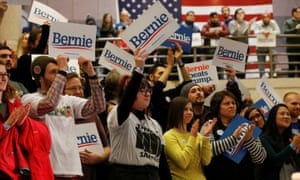Extract from The Guardian

Democrats voting in the Iowa caucuses grapple with the question of
not only which candidate would best govern but also who is most likely
to beat Trump
by Chris McGreal in Des Moines
by Chris McGreal in Des Moines
The candidates have put in thousands of miles crisscrossing rural Iowa
to show their faces to voters in living rooms, diners and community
halls. They’ve fielded questions, sparred with critics and tweaked
policies along the way. All the while their campaigns have flooded the
state’s television stations with homespun stories of the candidates’
lives and their catapulting visions for a better America, crammed into a
few seconds of political advertising.
Now it all comes down to Monday evening when Democrats will huddle in schools, libraries and churches across Iowa to hold the country’s first vote to decide who will challenge Donald Trump for the White House in November.
It’s a responsibility Iowans take seriously every four years, often
regarding themselves as the eyes and ears of America as their state’s
caucuses decide who will be first out of the gate, and into primary
races across the rest of the nation, with the huge advantage of a win
under their belt. It was Iowa in 2008 that teed up Barack Obama for the
presidency. Those who fall too far behind at this first hurdle rarely
make it much further down the course.Now it all comes down to Monday evening when Democrats will huddle in schools, libraries and churches across Iowa to hold the country’s first vote to decide who will challenge Donald Trump for the White House in November.

The big divide: ideology v electability
Ashly Moore, a 32-year-old occupational therapist, was grappling with exactly that question before she arrived at a Sanders rally in Des Moines.There are other issues at play, too. Age, gender and race all figure for some voters. But the big divide is over ideology v electability. It’s on the minds of the candidates, too.
“There is a lot of discussion about electability,” Bernie Sanders told the Des Moines rally. “Trump will be a very tough opponent. The only way that Trump is going to be defeated is if we have by far the largest voter turnout in American history.”
That, said Sanders, requires mobilising large numbers of people who don’t always vote, particularly the young and the working class. To make that happen, they have to be motivated with policies that are going to change their lives and their country.
“Young people today are the most progressive generation in the history of the United States of America. Historically, however, the simple truth is young people have not voted in the kind of way that they should have. Which campaign is capable of bringing millions of young people into the political process?” asked Sanders.
To Biden, that is all wrong. The way to get Trump out of the White House, he tells his supporters, is to win back those voters who turned away from the Democrats, albeit after they were in power for eight years when Biden was vice-president. He dismisses the notion that there is an untapped well of voters thirsting for radical policies.

‘They have to focus on voter turnout’
Opinion polls do not offer a clear roadmap. They have Sanders and Biden close in Iowa, with Buttigieg and Warren trailing them. But Biden currently leads nationally in the Democratic race. Perhaps more importantly, the polls do not show any of the candidates as a standout favourite to beat Trump in November.At the rally in Des Moines, Moore said she had long favoured Biden in part because she couldn’t see how Sanders could have broad enough appeal to beat Trump. But now she had seen Sanders speak, she understood what he would do for her and she was sold, not least because of his promise to erase university tuition debt.
“I have a lovely career as an occupational therapist but the amount of student loan debt I have is crippling,” she said.
The huge cost of university education is an issue for a lot of young people, and Moore said it opened her eyes to why Sanders might be right about how he can put together a winning coalition of voters.
“He has a great point that, in order for him to win, they have to focus on voter turnout for people who historically have not voted because they felt like their vote didn’t matter,” she said. “I didn’t really know how could Bernie win and I think he’s exactly right.”
But Moore still has nagging fears about Biden’s claim that Sanders’ radicalism will drive middle-of-the-road voters away.
“I am concerned about that. I think it’s a valid concern. But I also think Biden supporters like to fall on that and say it’s all about beating Trump,” she said.

‘Biden’s the only person that can beat Trump’
“Biden’s the only person that can beat Donald Trump,” said Shirley Crippen, a 66-year-old former flight attendant and Biden supporter. “That was the deciding factor for me. I was already leaning toward Joe but knowing that he is the one that can beat Trump was a huge, huge factor for me.”The Biden camp, and a good part of the Democratic establishment, fear the Trump campaign will hammer at Sanders as disloyal to America for a past that includes taking his honeymoon in the Soviet Union and allying with the Sandinista government in Nicaragua in the 1980s.
Crippen is more worried about Sanders and Warren’s policies driving away voters. She brushes aside their claims that it is those policies that will get young people out to vote in the presidential election.
“The win is totally dependent upon people that are independents, that are maybe Republicans that lean a little left. It’s the people that are undecided. Maybe some of the people that voted for Donald Trump only because they thought as a businessman he would be different and now they know that he was is definitely different but in a terrible way,” she said.

‘We need big ideas and we need to be willing to fight for them’
What’s radical for America – public healthcare, subsidised university education, reining in corporate power – may not seem that way in other parts of the world. But in a country steeped in half a century of politics blaming the government for people’s problems, there is hesitation and even fear at the idea of the state taking control of healthcare.Warren has hit back at the caution of Biden and Buttigieg by warning against the Democratic establishment’s tendency to retreat into what it regards as safe territory out of fear of losing voters.
“We need big ideas and we need to be willing to fight for them. It’s easy to back off from big ideas and make yourself sound so sophisticated and so smart,” she told Iowa voters. “They think that running a vague campaign that nibbles around the edges of these big problems is somehow a safe strategy.”
Still, Warren did retreat on her commitment to comprehensive public health insurance after Biden said it would drive up taxes. That may have cost her support just as she looked to be outpacing Sanders after his heart attack in October, because it touched on fears about Democratic leaders being too willing to abandon principled positions.
Dylan Baker, who has campaigned for Warren and came to see her speak in Des Moines, thinks she probably had little choice.
“I’ve been out knocking on doors and lot’s of people say, I really like Elizabeth Warren but I just don’t know if [public health insurance] is going to work. Even if they support it, they say they don’t know if enough independents will vote for it or if other Democrats will go for it. They’re too scared of it or say it costs too much,” he said.
Still, Baker is torn about the strategy. In the end he thinks Sanders is right, that radical policies are required to get voters out.
“I personally think energizing the youth is the answer,” he said.

‘You’re asking for drastic change and most liberals deal with incremental change’
At another Warren rally, Negus Imhotep, a 59-year-old African American man who works with young people to combat gang violence in Des Moines, said he likes both Warren and Sanders.“I think that they’re the only beacon of hope because if you look at the other candidates, especially Joe Biden, he’s asking for the same thing that you already have,” he said.
But Imhotep doubts Sanders or Warren will be able to overcome powerful entrenched forces and so isn’t even sure he’ll vote.
“I don’t think the system was created for somebody to destroy it. You’re asking for drastic change and most liberals deal with incremental changes,” he said.
Part of Imhotep’s frustration lies in his disillusionment with the Obama years, when the 2008 economic crash cost him his job delivering concrete. He couldn’t pay his mortgage and the bank took his house.
“Obama turned around and gave money back to the bankers, thinking that they’re gonna do the trickle-down effect, which hasn’t happened,” he said.
‘They say the African American vote is important but it seems to be only important during elections’
Polling suggests that Sanders, Warren and Buttigieg struggle to win support among black voters. Biden does better, perhaps in no small part because of his years as Obama’s vice-president, although as a senator he voted in favour of laws that contributed to the mass incarceration of black men. But the bigger issue among some African American voters is to find a candidate they believe is really listening to them.There’s also a nagging concern among some minority voters that candidates only talk about race to black people when it’s a message they should be pushing out much more forcefully to the country as a whole.
“It’s kind of insulting how candidates do that,” said Rachelle Long at a forum for candidates to address minority voters in Des Moines. “They say the African American vote is important but it seems to be only important during elections. After that it starts to get real vague. Before it’s, ‘I’m going to do it’. And then when they get in it’s, ‘We’ll try’.”
Dava James, a retired teacher, went to see Biden speak at a local hotel. She’ll vote for him and regards him as having served Obama well. But she lives in an Iowa district represented by Congressman Steve King, a Republican who once said white Americans did not have to worry about being a minority because blacks and Hispanics “would be fighting each other before that happens”.
James thinks King gets re-elected because most people in 85% white Iowa don’t understand what it is to be black, and she wanted to know from Biden how he would change that.
“I wanted to have him help me to publicize the fact that Iowans don’t always see what they have in common with a minority, even if they’re right there,” she said. “I’m not a white woman so I already know what I get in a salary is at the bottom of the list of what you do for a living.”

‘There’s just no way that we can risk another four years’
Alison McCarthy, an immigration lawyer, was a Sanders supporter back in 2016 and boycotted Clinton at the general election.“He’s an inspiring person. I’ve brought my kids here to the rally today so that they could feel the energy and take part of this excitement,” she said.
But even she has niggling doubts and thinks he may have to adjust his message on policies such as healthcare if he goes into the general election.
McCarthy said that if Sanders is the candidate, it would be essential that the broader Democratic party get behind him, even though she acknowledges she failed to back Clinton. With hindsight, she said she will back whoever the Democratic candidate is this year.
But then she hesitates.
“I hate voting in that strategic way instead of in a more principled way. But I feel that there’s just no way that we can risk another four years of Donald Trump at this point,” she said.
No comments:
Post a Comment